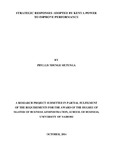| dc.description.abstract | Most Parastatals in Kenya are forced to confront diverse challenges in their internal
environment including rapid advances in information technology, the emergence of new
organizational forms and globalization of many markets has necessitated the need to adapt to
strategic responses to improve performance. To achieve the objective of this study, the
researcher investigated the strategic responses adopted by Kenya power to improve
performance. To realise the objective of this study, a case study was used. An interview guide
was used for data collection purposes. The study used primary data since the nature of the
data to be collected is qualitative in nature. Primary data was collected by interviewing five
departmental heads at Kenya Power, these departments are namely: marketing department,
Customer service department, human resource department, the finance department and IT &
T department. The interview guide contained two sections: section A contained questions on
the general information about the respondents while section B contained questions about the
strategies adopted by Kenya power to achieve organizational performance. A face to face
interview was conducted with five senior management and departmental heads that were
responsible for making strategic decisions on strategic responses to be adopted by the firm to
maintain and sustain competitiveness through continuously providing quality goods and
services. Data was analysed using content analysis. The three strategic responses adopted by
Kenya Power were found to be: product innovation, diversification and corporate rebranding.
It was further concluded that the organization had invested in modern technologies. For
example, it has invested in information communication technology to align itself with the
needs of the customers. This leads to providing more integrated and flexible products that
lead to increased revenue collection and thus improvement in organizational performance.
The following recommendations were made: This study recommends that there should be
regular replacements of the company’s infrastructure e.g. transformers to reduce the number
of break downs. This study further recommended that the organization should develop and
cultivate a culture of rewarding its employees to motivate them to work even harder. The
study also recommended that the organization should consider hiring qualified and authentic
contractors when outsourcing services like power lines construction to avoid surging lines
and falling poles. Fourthly, the study recommended that, Kenya Power should offer training
and educational programs to its employees and customers so that customer queries can be
sorted out on real time through. This is by using facilities like the internet for online services
delivery which is very convenient, cost effective and saves on time. The study also
recommended that the Kenya power should invest largely on customer care centres in all the
47 counties in Kenya where all customers’ queries can be addressed within the region thus
improving on resolution time. Future researchers and academicians should do further research
on the strategic responses adopted by the public sector to improve performance. A study can
be conducted in relation to the effect of strategic responses on organizational performance
among commercial banks in Kenya. Findings and conclusions can be compared to establish
whether there are areas of commonalities or unique factors. A similar study can be conducted
after a period of ten years since different technological innovations may have taken shape and
thus affecting the level of organizational performance. The findings can then be compared to
find out if there is any similarity or differences. The limitation faced by the researcher during
data collection was that the managers were too busy and therefore the researcher had to
interview their deputies whom to some extent may not be more experienced than the
managers. Lastly, the other challenge faced by the researcher was that there was no control
over the data collection; some of the respondents gave out incomplete questionnaires while
others failed completely to fill the questionnaires. | en_US |

